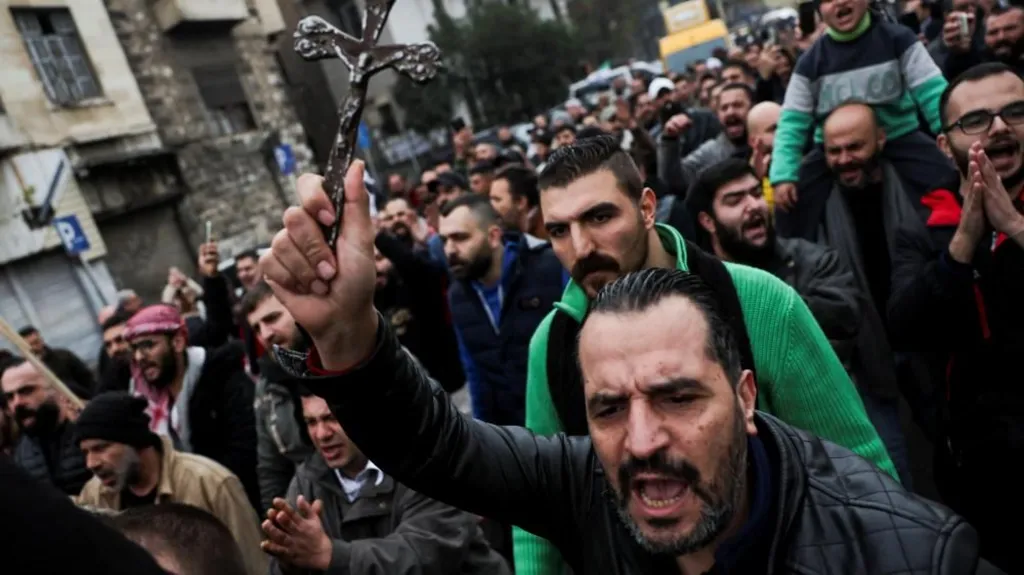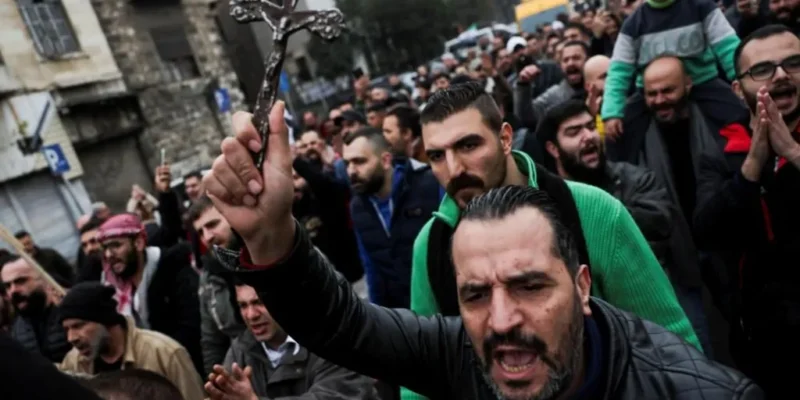
Protests broke out across Damascus on Tuesday in response to a recent arson attack, with demonstrators taking to the streets in several neighborhoods of the Syrian capital. In the Kassa district, protesters were seen chanting slogans against foreign fighters in Syria, specifically referencing the foreign elements accused by the Hayat Tahrir al-Sham (HTS) group of being behind the attack. “Syria is free, non-Syrians should leave,” the crowds chanted, reflecting growing concerns over external influences in the country.
Meanwhile, in the Bab Touma neighborhood, a significant Christian area of the city, protesters carried Syrian flags and a cross while chanting, “We will sacrifice our souls for our cross.” One demonstrator, identified as Georges, spoke to AFP, expressing the sentiment of many: “If we’re not allowed to live our Christian faith in our country, as we used to, then we don’t belong here anymore.”
Syria’s diverse religious and ethnic groups, including Kurds, Armenians, Assyrians, Christians, Druze, Alawite Shia, and Arab Sunnis, have long faced challenges in maintaining peace and security amid ongoing conflict. The recent shift in power following the fall of Bashar al-Assad’s presidency, which was overtaken by rebel forces, has brought a sense of uncertainty, particularly among Syria’s minority communities, who are concerned about their future under the new leadership.
The Syrian government, now under the control of the HTS-led coalition, has made recent efforts to present a more inclusive political vision. HTS, originally a jihadist group advocating for the establishment of an Islamic state governed by Sharia law, has gradually shifted towards a more pragmatic approach in recent years. However, it remains unclear how this shift will affect the governance of Syria, especially in light of protests by minority groups.
On Tuesday, the newly established authorities in Syria announced that HTS leader Ahmed al-Sharaa had reached an agreement with various revolutionary factions to dissolve and merge all armed groups under the Ministry of Defence. Prime Minister Mohammed al-Bashir confirmed that the ministry would be restructured to include fighters from former rebel factions. However, it remains uncertain which groups are included in the merger, given the fragmented and often ambiguous relationships between various armed factions in Syria.
HTS remains on the United Nations’ list of designated terrorist organizations, as well as those of the United States, European Union, and the United Kingdom. Despite this, there have been signs of a shift in diplomatic relations. Notably, the United States recently removed a $10 million bounty on HTS leader Ahmed al-Sharaa, following diplomatic meetings with representatives from the group.
Meanwhile, the U.S. military continues its operations in Syria. On Friday, the U.S. carried out an airstrike in Deir Ezzor, killing two members of the Islamic State (IS) jihadist group.
As Syria navigates this new chapter under HTS leadership, the presence of foreign fighters, extremist groups, and regime supporters who may seek to destabilize the country remains a significant challenge. The fate of Syria’s minority groups hangs in the balance, as they seek assurances for their safety and freedom to practice their faith and culture in a country torn apart by years of conflict.

Comments